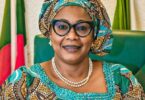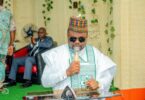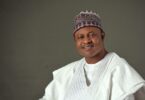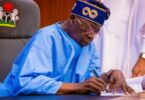‘FUEL subsidy is gone!” President Bola Ahmed Tinubu stated categorically as he delivered his inaugural speech as Nigeria’s President on May 29, 2023. Though we were later told that those words were not expressly contained in the written address, as the President later confirmed that in uttering the words, he was “overtaken by courage,” the pin-drop silence at the Eagle Square, Abuja, venue of the inauguration was unmistakable as he made the declaration. Nigerians at the venue sneaked glances at one another, perhaps to confirm the veracity of what they were hearing and possibly reassure themselves they heard the president well. Even then, the president readjusted himself and continued his long speech which dwelt on the Renewed Hope mantra of his administration.
That scenario at the Eagle Square, Abuja, venue of the presidential inauguration ceremony captured the dramatic entry of President Bola Ahmed Tinubu into the annals of the nation’s presidency in May. And in 100 days, the Presidency has been largely tentative, behaving more like a health worker called into the emergency ward in the dead of the night and one scampering to apply whatever dose can breathe life into the dying patient.
His courage has billowed occasionally from the reassuring words, but as we can see, in 100 days, more Nigerians appeared to have landed on the wrong side of prosperity, despite gasping for life all through the eight years of his immediate predecessor, President Muhammadu Buhari.
The twin policies of fuel subsidy removal and floating of the Naira, which he immediately implemented, appeared to have combined to inflict more misteries on Nigerians, as the implementation of those policies was immediately welcomed by galloping inflation, labour unrest and the continuous slide in the value of the Naira.
One thing we have seen, however, is that in the last 100 days, there has not been a dull moment. The government has been actively engaging, striving to explain the difficult policies it is implementing. President Tinubu himself has likened the situation to that of the process of childbirth, which comes with excruciating pains and called on the citizens to be patient with the administration. His government has also been fixing the structures and pillars of the administration, including the appointment of service and security chiefs, suspension, arrest, detention and prosecution of the Governor of Central Bank of Nigeria (CBN), Mr. Godwin Emefiele, the removal of the Chairman of Economic and Financial Crimes Commission (EFCC), Mr. Abdulrasheed Bawa, the appointment of the largest cabinet (45 ministers) since the inception of the Fourth Republic. At the same time, citizens have continued to lament the growing economic challenges across the strata of society.
There is also the uninspiring story from the security sector. In 100 days, Jos, Plateau State and its interiors of Mangu have been boiling, witnessing the unwarranted killing of innocent farmers by unknown bandits, same as Benue, Kaduna and Niger. Kidnapping and other sundry crimes have continued with staggered responses from the security agencies. As if there was no single break between the administration of immediate past President Buhari, the bloodletting appeared not to have an iota of respect for the new era. To cap the ugly trend, some bandits claimed to have recently masterminded the killing of 36 officers and men of the Nigerian military in Niger state, while also claiming to have downed a jet of the Nigerian Air Force.
While it is undeniable that locally, the government has been besieged at the socio-economic front in its first 100 days, the sub-continental and continental burden of a ‘defender of democracy’, the president has been saddled with, appears to add its own dimension. Within weeks of assuming office, Tinubu attended the Heads of State and Governments’ meeting of the Economic Community of West African States (ECOWAS) and it was his turn to assume the chairmanship of the body.
He immediately defined his focus as one that would not tolerate an unconstitutional takeover of government. But before he could bat an eyelid, Nigeria’s neighbour to the North, Niger Republic woke up to the announcement of a coup. Last week, Gabon, in Central Africa equally witnessed its own change of power with the military sweeping aside the democratic government in that country. That obviously adds some load to the already heavy continental and local challenges Tinubu has to face.
While the Niger coup appears an affront to the resolve of the ECOWAS to keep faith with its resolution to defend democratic rule, the approach by the sub-regional body, especially the headmaster/pupil style of dishing orders to the junta seems to have so far complicated any form of breakthrough in managing the delicate political crisis.
Aftermath of fuel subsidy removal
Tense moments immediately became the order of the day as soon as the news filtered that Tinubu had removed the much-talked-about fuel subsidy. There were threats of the total shutdown of the economy by the Labour unions. The Naira had collapsed following the decision to float it, leading to galloping inflation, dwindling purchasing power of the citizens and such socio-economic stress. There has also been tentativeness from the political scene, legalistic combustion from the courtrooms of the Presidential Elections Petition Court (PEPC) and other forms of drama by some workforce, including the National Association of Resident Doctors.
But whether the consequences of the president’s podium declaration on the inauguration day were all about renewed hope or renewed challenge is something that didn’t take too long for citizens to ascertain as the streets immediately reacted to the “subsidy is gone” declaration.
As soon as the thunderbolt dropped off President Tinubu, the streets became restive. Fuel stations that were just recovering from the staccato supplies of the Buhari era and had happily opened for the day’s business in readiness for a new dawn immediately shut their gates. For the ones with supplies in their underground tanks, a bazaar has just been announced in Abuja. And so the citizens had to relive the fuel scarcity-induced hardship all over again.
Even before the Nigerian National Petroleum Corporation Limited (NNPCL) came up with its new price regime, fuel prices jumped above N400 per litre for a few stations that ventured to sell, while the black market became the more plausible point of supply. When the NNPCL eventually replied, it announced that fuel should be sold nationwide for between N480 and N570 per litre. That was an almost 200 per cent increase from between N187 to N200 per litre of fuel sold ahead of the May 29 handover.
With the adjustment in the pump price of petrol came the attendant inflation, especially the increment in transport fares across the country and the troubles with organized Labour.
As usual, the Nigerian Labour Congress (NLC) and the Trade Union Congress (TUC) did not hesitate to roar against the fuel price increase of May 29. It threatened to shut down the economy if the government would not introduce palliatives within weeks. The organized Labour said that the administration must cushion the effects of the fuel subsidy removal, failing which it would not hesitate to call out workers for industrial action. It also demanded a new minimum wage of N150,000, adding that the high cost of fuel was inflicting unbearable hardship on Nigerians.
On June 5, the Federal Government and a team of the organised Labour met to agree on measures to cushion the effects of fuel subsidy removal. Chief of Staff to the President, Hon. Femi Gbajabiamila, read a communiqué of the meeting thus: “The Federal Government, the TUC, and the NLC to establish a joint committee to review the proposal for any wage increase or award and establish a framework and timeline for implementation.
“The Federal Government, the TUC and the NLC to review the World Bank Financed Cash transfer scheme and propose the inclusion of low-income earners in the programme.
“The Federal Government, the TUC and the NLC to revive the CNG conversion programme earlier agreed with Labour centres in 2021 and work out detailed implementation and timing.”
Later in the middle of June, the parties met again and it was resolved that the National Economic Council would lead the charge towards fashioning the best option to secure a cushion for subsidy removal.
One of the earliest proposals by the Tinubu administration was the plan to pay N8,000 to 12 million households, a carryover from the administration of Muhammadu Buhari, who had negotiated a World Bank loan to the tune of $ 800 million for the planned palliative.
President Tinubu had to communicate his intention to carry through the idea in a letter to the 10th National Assembly to seek approval for the loan. He explained that the loan would be used to scale up the National Social Safety Net Programme.
His letter to the assembly read in part: “Please note that the Federal Executive Council (FEC) led by President Muhammadu Buhari approved an additional loan facility to the tune of $800 million.
“This is to be secured from the World Bank for the National Social Safety Net programme…
“You may also wish to note that the purpose of the facility is to expand coverage of shock-responsive safety net support among the poor and vulnerable Nigerians. This will assist them in coping with basic needs.
“You may further wish to note that under the conditional cash transfer window of the programme, the Federal Government of Nigeria will transfer the sum of N8,000 per month to 12 million poor and low-income households.
“This is for a period of six months with a multiplier effect on about 60 million individuals.
“In order to guarantee the credibility of the process, digital transfers will be made directly to beneficiaries’ accounts and mobile wallets.”
It, however, didn’t take long before the majority of the stakeholders agreed that the Buhari model cannot be adopted in today’s Nigeria because of the questionable database of beneficiaries. Under the Buhari government, the Ministry of Humanitarian Affairs and Disaster Management claimed to have lifted millions out of poverty and fed thousands of children even when schools were closed as a result of the dreaded covid-19.
The National Economic Council (NEC) was to later declare that the data available from the Humanitarian Ministry was unreliable, leading to a shift of the burden to the states. Eventually, the NEC agreed on the need to approve a palliative measure of N5 billion per state. The funds have since been repatriated to the states, creating another level of headache of its own.
Floating of the Naira
Following the June 9, 2023 suspension of the CBN Governor, Mr. Godwin Emefiele, the stage was set for the adjustment of policies he hitherto implemented which were regarded as blocking investors’ initiatives in the economy. And on June 14, the CBN announced it was floating the Nigerian currency, in what experts termed an attempt to merge the official and black market rates as well as wipe off the myriads of foreign exchange windows operated under the Buhari administration.
What immediately emerged, however, was that the administration had found a way to devalue the Naira as the currency moved from the official rate of N400 to the dollar to N750 per United States dollar. Reports indicated that the new development would ensure that buyers and sellers of foreign currency in the official Foreign Exchange market are now allowed to quote rates they find comfortable with, as against previous practice where rates were dictated by the Central Bank of Nigeria (CBN). The Investors and exporters (I&E) window of the market immediately jumped the rates to between N750 and N755 to the dollar.
That development also indicated that the Naira immediately lost between 21 and 25 per cent of its value within one month of Tinubu’s administration.
The end result of the Tinubu tweaks on the economy thus far is said to have largely led to a rise in the cost of living, following the high inflation and weakened purchasing power of citizens, among other travails. All these as experts would say, are linked to the twin effects of the exchange rate policy and the increase in the price of petrol products.
A second fuel price increase
The development around the Naira immediately impacted the pump price of petrol, which Tinubu had announced had been completely deregulated. The NNPC wasted no further time adjusting the pump price for a second time following a further loss in the value of the Naira. The prices jumped from the upper limit of N570 to N617 per litre, effective July 18. The NNPCL, which midwifed the new price regime said that the decision was due to market forces. “We have a marketing wing of our company. They adjust prices depending on the market realities,” Mele Kyari, NNPCL’s Chief Executive had said in response to the new price increase in July.
It was, however, obvious that the said market forces were only dictated by the declining fortunes of the Naira which continued to nosedive and at a point, etched around the upper limit of N900. This again fueled the agitation among the organized Labour, whose continuous parleys with the Federal Government’s delegation appear endless. On the dot of the administration’s 100 days, the NLC announced a two-day warning strike to press home demands that the administration should put in place proper palliatives and a new wage structure. Though the NLC and its compatriots in the Trade Union Congress (TUC) appeared to have parted ways on the latest round of strikes, the desire by the two labour centres to secure palliatives for workers and generality of Nigerians as well as the push for new minimum wage has not waned.
Foreign policy
At the 63rd ordinary session of ECOWAS, held in Bissau, the Guinea-Bissau capital, President Tinubu emerged as the Chairman of the regional body. He declared at the meeting: “We must stand firm on democracy. There is no governance, freedom and rule of law without democracy. We will not accept coup after coup in West Africa again. Democracy is very difficult but it is the best form of government.”
Tinubu added: “You will all agree with me that democracy and good governance are the cornerstones of peace and sustainable development of every society. I’m fully committed to deepening democracy and good governance in the region.
“We must strengthen our democratic institutions and ensure the respect for human rights and the rule of law. I will enhance engagements with the countries in transition to ensure their quick return to democratic rule.
“There is no one here among us who did not campaign to be a leader. We didn’t give our soldiers resources, we didn’t invest in them, in their boots, in their training to violate the freedom of the people. To turn their guns against civil authorities is a violation of the principles upon which they were hired, which is, to defend the sovereignty of their nations. We must not sit in ECOWAS as toothless bulldogs.
“You will all agree with me that democracy and good governance are the cornerstones of peace and sustainable development of every society. I’m fully committed to deepening democracy and good governance in the region.
“We must strengthen our democratic institutions and ensure the respect for human rights and the rule of law. I will enhance engagements with the countries in transition to ensure their quick return to democratic rule.”
That declaration has been the guiding principle of the Tinubu administration since its inception, but developments in Niger, Gabon, Mali and other countries appear to confirm deep issues that revolve around the practice of democracy on the continent. The Tinubu declaration equally informed his approach to the Niger Republic coup, which came barely two weeks into his ascendancy as ECOWAS chairman. Despite that resolve, Niger and Gabon have happened, thereby complicating African leaders’ resolve to defend democracy.
Perhaps, Tinubu needs to take a cue from former President Olusegun Obasanjo, who said in a recent interview that there are deep issues influencing the epidemic of coups in Africa. Rather than rising in unison to condemn illegal takeovers when they occur, can African leaders ensure a sort of peer review that would emphasise the delivery of democratic dividends?
Thus far, it can be said that since Tinubu took over as president, Nigerians have yet to see lasting policies that showcase a proper diagnosis of the socio-economic challenges he inherited as President. There are clear fundamentals on the socio-economic and political fronts, but no one can clearly state the direction of the Tinubu government as per the solutions. For instance, the fuel subsidy removal issue is just a part of the main issue, which is the continuous reliance on imported petroleum products and that in itself, is an offshoot of the collapse of the nation’s four refineries. That also impacts heavily on the fate of the Naira because as the nation earns money from crude sales, it wastes the gains on importing finished petroleum products.
While the administration has been mouthing its desire to improve tax collections and enhance revenue generation, there is also the added challenge of crude oil theft and failure of the administration to meet the oil quota allotted to it by the Organisation of Petroleum Exporting Countries (OPEC). The loss of a huge 400,000 barrels per day cannot be regarded as a serious driver that would address economic woes. The administration has yet to proffer lasting solutions to these hydra economic challenges. Perhaps, this situation could be attributable to the late take-off of the national cabinet, the administration would only worm itself into the hearts of the people if it could enunciate some clear-cut measures to deal with the endemic and seemingly perennial socio-economic and political challenges.
YOU SHOULD NOT MISS THESE HEADLINES FROM TheWitness
19 people kidnapped, 30 killed in Abuja landslide
Unknown gunmen suspected to be bandits on Thursday abducted nineteen people in Bwari Area Council of the Federal Capital Territory (FCT), Abuja, the nation’s capital…
G-20 Summit: Let’s use our diversity for prosperity, national development — Tinubu
President Bola Tinubu has called on Nigerians to harness the country’s rich diversity as a uniquely powerful tool for advancing prosperity and national development for the benefit of all citizens...
Peter Obi rejects Tribunal verdict, heads to Supreme Court
The Labour Party’s (LP) Presidential Candidate, Peter Obi, has rejected the Presidential Election Petitions Court decision on the February 25, 2023 election, calling it unjust...
Nigeria lost $46bn crude oil stolen in 11 years – Speaker Abbas
Speaker of the House of Representatives, Hon. Tajudeen Abbas, on Thursday, expressed concern over unabated crude oil theft worth $46 billion (the equivalent of N16.25 trillion) between 2009 and 2020...
Confusion at Lagos airport over relocation of foreign flights
Confusion continues to reign at the International Wing of the Lagos Airport following the relocation of flight activities to the new terminal. Hitherto yesterday, flight operations, including passenger profiling, processing, check-in and others, were being conducted at the old terminal building...
EDITORIAL: The N81bn expenditure on tree planting
RECENTLY, the House of Representatives ad-hoc committee investigating the utilisation of Ecological Funds and other intervention funds of the Great Green Wall Project sent shockwaves across the country when it revealed that the National Agency for Great Green Wall (NAGGW) had spent N81bn to plant 21 million trees in 11 states, namely Kebbi, Sokoto, Zamfara, Katsina, Kano, Jigawa, Bauchi, Gombe, Adamawa, Yobe and Borno…







